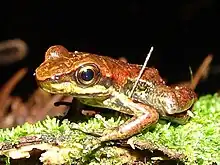Hylodidae
Hylodidae, commonly known as giant Neotropical torrent frogs, is a family of frogs native to Brazil and northern Argentina.[1][2][3] Phylogenetic evidence suggests the Hylodidae being the sister group to the Alsodidae.[4]
| Hylodidae | |
|---|---|
 | |
| Hylodes meridionalis | |
| Scientific classification | |
| Domain: | Eukaryota |
| Kingdom: | Animalia |
| Phylum: | Chordata |
| Class: | Amphibia |
| Order: | Anura |
| Superfamily: | Hyloidea |
| Family: | Hylodidae Günther, 1858 |
| Type genus | |
| Hylodes Fitzinger, 1826 | |
Megaelosia goeldii is one species that lost the ability to produce vocalizations which in turn is denoted as mute. Through observation of aggressive interactions, it was found that the species' vocal sacs are used for one form of its visual signaling and communication. [5]
Diversity
The family contains 48 species in four genera:[1][2]
- Crossodactylus A.M.C. Duméril & Bibron, 1841 (13 species)
- Hylodes Fitzinger, 1826 (26 species)
- Megaelosia Miranda-Ribeiro, 1923 (one species)
- Phantasmarana Vittorazzi, Augusto-Alves, Neves-da-Silva, Carvalho-e-Silva, Recco-Pimentel, Toledo, Lourenço & Bruschi, 2021 (eight species)
References
- Frost, Darrel R. (2015). "Hylodidae Günther, 1858". Amphibian Species of the World: an Online Reference. Version 6.0. American Museum of Natural History. Retrieved 28 April 2015.
- "Hylodidae". AmphibiaWeb: Information on amphibian biology and conservation. [web application]. Berkeley, California: AmphibiaWeb. 2015. Retrieved 28 April 2015.
- Blackburn, D.C.; Wake, D.B. (2011). "Class Amphibia Gray, 1825. In: Zhang, Z.-Q. (Ed.) Animal biodiversity: An outline of higher-level classification and survey of taxonomic richness" (PDF). Zootaxa. 3148: 39–55. doi:10.11646/zootaxa.3148.1.8.
- "Hylodidae Günther, 1858 | Amphibian Species of the World". amphibiansoftheworld.amnh.org. Retrieved 2022-09-11.
- Augusto-Alves, Guilherme; Dena, Simone A.; Toledo, Luís F. (2018). "Visual communication and aggressive behaviour in a giant mute torrent-frog, Megaelosia apuana (Anura; Hylodidae)". Amphibia-Reptilia. 39 (2): 260–264. doi:10.1163/15685381-20181000. ISSN 0173-5373.
This article is issued from Wikipedia. The text is licensed under Creative Commons - Attribution - Sharealike. Additional terms may apply for the media files.